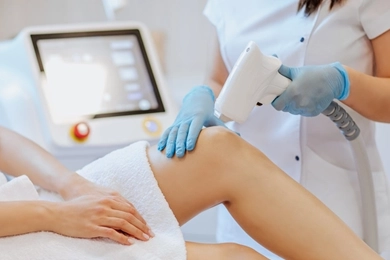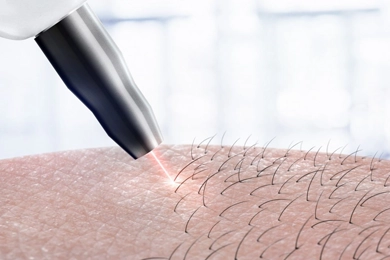
A laser is used in the common cosmetic process of laser hair removal to target and eliminate unwanted hair. This non-invasive technique can be done on practically any portion of the body and is effective for both men and women. This article will discuss the procedure of laser hair removal, its advantages and disadvantages, and what to anticipate during and after the laser hair removal.
A focused light beam is used in laser hair removal to hit the hair follicles. The pigment in the hair absorbs the light energy, which turns into heat and kills the hair follicle without harming the skin around it. Long-lasting hair decrease results from the treated hair follicles' inability to create new hair.
It is crucial to locate a qualified, experienced, and successful provider before undergoing laser hair removal. A meeting with the provider should be scheduled in order to go over your medical history, skin type, and any drugs you are taking right now. This will make sure you are a good candidate for the laser hair removal and assist the provider choose the proper laser settings.
Also, it's crucial to limit your exposure to the sun for at least two weeks before the laser hair removal. Sun exposure can raise the risk of problems and make the skin more vulnerable to laser damage. Moreover, for at least four weeks prior to the laser hair removal, you should refrain from waxing or plucking the hair in the treatment area. The presence of the hair follicle is required for the laser to work because it targets it.
The treatment area will be disinfected the day of the laser hair removal, and a topical numbing medication may be used to lessen any discomfort. In order to safeguard your eyes from the laser light, you will also be provided with safety glasses to wear throughout the laser hair removal.
The laser will be moved across the treatment region during the laser hair removal in brief, precise pulses. If you experience any discomfort, it could feel like a rubber band snapping across your skin and the numbing lotion should help to lessen it. The size and location of the treatment region will determine how long the laser hair removal lasts, however typical sessions last between 30 and an hour.
You can have some oedema, irritation or redness in the treated area after the laser hair removal. This is expected, and it will pass in a few hours to a few days. To ease any discomfort or swelling, you might apply a cool compress to the region.
After the laser hair removal, it's crucial to stay out of the sun for at least two weeks, and if you must go outside, make sure to wear sunscreen with at least SPF 30. Sun exposure may decrease the procedure's efficacy and raise the risk of complications. For at least four weeks following the procedure, you should refrain from waxing or plucking the hair in the treated area. Before the following session, the hair follicles require time to shed and grow new hair.
Long-lasting hair reduction is possible with laser hair removal. After just one session, the majority of patients notice a considerable slowdown in hair growth; however, it takes several sessions to accomplish permanent hair reduction. You can benefit from smoother, hair-free skin for months or even years as a result.
Without causing any skin damage to the surrounding area, precision laser hair removal precisely targets the hair follicles. This makes it the perfect remedy for areas like the face, underarms, and bikini line that are challenging to wax or shave.
Depending on the size of the treatment area, laser hair removal sessions are rapid and convenient, lasting 30 minutes to an hour. There is no downtime required following the treatment; you can instantly return to your regular routines.
Risks are present with laser hair removal, just like with other cosmetic laser hair removal.
The following are some of the most typical side effects:
You can have some swelling and redness in the treated area after the laser hair removal. This is expected, and it will pass in a few hours to a few days.
Rarely, and more so in those with darker skin tones, laser hair removal might result in skin discoloration. This may involve either hypopigmentation or skin darkening known as hyperpigmentation (lightening of the skin). With more recent laser technology, which are intended to be secure for all skin types, this is less frequent.
If the laser is not calibrated correctly or the treatment region is not properly prepped, laser hair removal can also result in burns. This is uncommon, but it can be avoided by selecting a skilled doctor and adhering to all pre- and post-operative instructions.
Scarring can result during laser hair removal if the skin is injured, though this is extremely uncommon. If the doctor is unskilled or the patient has a history of keloids, this is more likely to happen (raised scars).
Long-lasting hair reduction can be achieved safely and effectively using laser hair removal. Although laser hair removal has some risks and potential adverse effects, by choosing a skilled and experienced physician and according to all pre- and post-procedure instructions, these can be reduced. To review your options and decide if laser hair removal is the best course of action for you, make an appointment with a qualified practitioner if you're thinking about it. You can have smooth, hair-free skin for months or even years with the right upkeep and care.
Targeting the pigment in the hair follicle with a laser or concentrated beam of light is how laser hair removal works. The pigment in the hair absorbs a pulse of light from the laser, converting it into heat as a result. The hair follicle is damaged by this heat, which prevents new hair development.
The laser is moved across the treatment area while being pointed at the skin's surface during a laser hair removal session. The pigment in the hair follicle absorbs the light energy that the laser generates after travelling through the skin. The heat produced by the light energy absorption destroys the hair follicle and prevents new hair growth.
Usually, it takes several laser hair removal sessions to get the best results. This is due to the fact that hair grows in cycles, and the laser is only useful for hair that is actively growing. Targeting hair at various stages of its growth cycle with a series of treatments spaced several weeks apart will assist to get the most hair possible treated and provide effects that last.
The effectiveness of laser hair removal is influenced by the skin tone of the patient, the colour and thickness of the hair, and other variables. Dark, coarse hair and lighter skin tones tend to be the best candidates for laser hair removal.
Newer laser technologies, however, are created to be secure and efficient on a variety of skin tones and hair tones. To find out if laser hair removal is a good fit for you and to create a treatment plan that is personalised for your particular requirements and objectives, it is crucial to speak with a skilled and experienced provider.
While providing long-term hair reduction, laser hair removal is not thought of as a permanent hair removal method. This is because not all hair follicles are actively growing at the same time, and laser hair removal only targets hair follicles that are in the active growth phase. Hence, the laser may not have an impact on all hair follicles during the initial treatment.
Laser hair removal, on the other hand, can effectively slow down hair development across several sessions, leaving skin smoother and with less hair regrowth. Depending on a person's specific characteristics, including hair colour, skin type, and the area being treated, different levels of hair loss can be obtained with laser hair removal.
In order to sustain the effects of laser hair removal, it is also crucial to keep in mind that occasionally touch-up sessions may be required. This is because new hair follicles may become active and hair growth patterns may alter with time.
Overall, laser hair removal can be a very successful way to get rid of unwanted hair, but it's not a long-term fix. Laser hair removal can deliver long-lasting effects that significantly lessen the need for additional hair removal techniques with the correct expectations and aftercare.
The number of sessions required for laser hair removal varies based on the area being treated, the thickness and colour of the hair, and the person's skin type.
Typically, a course of six to eight sessions is advised for the best outcomes. This is due to the fact that hair grows in cycles, and laser hair removal only works on hair that is actively growing. To treat as many hair follicles as feasible, multiple treatments spaced several weeks apart allow the laser to target hair throughout various growth cycles.
It is significant to remember that the quantity of treatments required may change based on how each person responds to treatment. To get the outcomes they want, some folks might need more or less sessions. Based on specific circumstances, the therapy provider can assist in determining the right amount of sessions.
To get the best outcomes, it's crucial to adhere to the suggested treatment course and timetable. Laser hair removal can lose some of its effectiveness if sessions are skipped or put off, and it might take more sessions to see the desired results. Also, to keep results over time, touch-up treatments may be required on occasion.
Although there may be some discomfort or pain associated with laser hair removal, most individuals find it acceptable and controllable. Depending on a person's sensitivity to pain, pain threshold, and the area being treated, laser hair removal can cause varying degrees of pain or discomfort.
A light pulse that the laser creates during laser hair removal may feel like a rubber band cracking across the skin. Some people say the sensation is similar to a little sunburn or prickling. Usually, the discomfort lasts only a little while and goes away right away as the therapy is over.
Before to laser hair removal, the treatment region may be numbed with a topical anaesthetic lotion to assist reduce pain. The skin is also cooled and soothed by built-in cooling systems in more recent laser technology, which helps to lessen discomfort.
The skin may be slightly sensitive and red after the procedure, just like it would be after a minor sunburn. Usually only transient, this should pass in a few hours to a day.
Any worries regarding pain or discomfort should be brought up with the healthcare professional administering the treatment. They might be able to suggest methods or items to lessen discomfort both during and after therapy.
Many people find laser hair removal to be a safe and efficient procedure, but not everyone is a candidate. Candidates who respond best to laser hair removal include:
It's vital to remember that not everyone is a good candidate for laser hair removal. A person may not be a good candidate for treatment if they have specific skin or medical issues, such as a history of keloid scarring or certain drugs that make the skin more sensitive to light. Any worries or inquiries about candidature should be brought up with a licenced healthcare professional.
Laser hair removal may have side effects, but they are normally minor and transient, just like with any medical operation.
The following are some typical side effects of laser hair removal:
It's crucial to select a trained professional with laser hair removal knowledge to reduce the danger of side effects. Also, it's crucial to adhere to all pre- and post-treatment guidelines given by the therapist. It is crucial to inform the provider right once if any negative effects develop.
The size of the treatment area determines how long the laser hair removal procedure will take. While bigger areas like the back or legs can take up to an hour or longer to treat, smaller areas like the upper lip or underarms can just require a few minutes.
The total amount of time can vary depending on a variety of factors, including the size of the treatment area and the number of sessions necessary for the best outcomes. To achieve long-lasting hair reduction, laser hair removal often takes a series of sessions spaced several weeks apart. Many individual characteristics, like hair thickness, skin type, and the area being treated, can affect the precise number of treatments required.
"On average, most patients need 6 to 8 treatments to receive the best outcomes, but individual circumstances may differ. In order for the laser to efficiently target the hair follicle, each laser hair removal session is normally spaced 4 to 6 weeks apart to allow the hair to enter the growth phase.”
It is significant to realise that laser hair removal requires time, but the durable effects are frequently worth the expense. People can reduce the number of sessions required and obtain the best results quickly by picking a qualified practitioner and adhering to all pre- and post-treatment guidelines.
Except for the eyelids and the region around the eyes, practically any portion of the body can be treated with laser hair removal. Legs, the bikini area, underarms, the chest, back, face, and neck are a few of the most popular places for laser hair removal treatments.
It's crucial to remember that not everyone or every part of the body may respond well to laser hair removal. Depending on the skin type, hair colour, and thickness and density of the hair in the treatment area, laser hair removal may or may not be effective. Those with fair skin and dark hair, for instance, typically get the best results, but people with lighter skin or darker hair could need more sessions or alternative hair removal techniques.
Furthermore, some body parts may be more sensitive to or prone to skin irritation than others. For instance, the skin behind the arms or in the bikini area may be more delicate than that on the back or legs. A skilled practitioner can assist in determining whether laser hair removal is appropriate for a certain area of the body and can suggest the best course of action based on the circumstances.
Generally speaking, laser hair removal involves little to no downtime, and the majority of patients can resume their regular activities right away. The treated area may occasionally experience moderate redness, swelling, or irritation in some people, although this usually goes away within a few hours to a day.
For at least a week after treatment, it's critical to limit sun exposure and wear a broad-spectrum sunscreen with an SPF of 30 or higher in the treated region. This can lessen the chance of issues following therapy, like skin irritation or hyperpigmentation.
Additionally, it's crucial to refrain from any practises that could irritate the skin in the treated area for at least 24 to 48 hours following treatment. Examples include taking hot showers, swimming in chlorinated pools, or using abrasive skincare products.
Although there is normally no downtime associated with laser hair removal, it is crucial to adhere to all post-treatment advice offered by the practitioner to achieve the best outcomes and reduce the chance of issues. It's crucial to tell the provider right away if any odd symptoms develop, such as extreme redness, swelling, or blistering.
The size of the treatment area, the number of treatments required, and the provider performing the procedure are just a few of the many variables that can affect the price of laser hair removal. Larger treatment areas, such the back or legs, will typically cost more than smaller areas, like the upper lip or underarms.
Depending on the practitioner and the treatment area, a single laser hair removal session may cost $50 to $500 or more. The majority of patients will need a series of treatments separated by several weeks, which can raise the overall cost.
The price of laser hair removal may seem exorbitant, but compared to other hair removal techniques like waxing or shaving, which need constant upkeep and expense, it can be a more affordable long-term solution.
To get the best outcomes and reduce the risk of consequences, it's crucial to select a qualified provider with experience using laser hair removal. In order to make laser hair removal more cheap, certain providers could propose package deals or financing options. To explore pricing and payment choices depending on unique requirements and goals, it is preferable to speak with a provider.
The majority of skin types can benefit from laser hair removal, but it's crucial to remember that the procedure's efficiency and safety can change based on the patient's skin tone and hair type. Those with light skin and dark hair respond to laser hair removal the best because the contrast between the skin and hair makes it simpler for the laser to target the hair follicles.
Yet with the development of laser technology, it is now possible to treat people with darker skin tones in a safe and efficient manner. In order to prevent skin damage, laser hair removal service providers may either employ specialist lasers that are safe for use on darker skin tones or modify the laser's settings.
To get the greatest results and reduce the risk of consequences like skin discoloration or burns, it is crucial to select a qualified physician with experience treating a variety of skin types.
Red, blonde, or grey hair may make a person a poor candidate for laser hair removal since these hair colours are harder for the laser to target. Other hair removal techniques like electrolysis or waxing may be more appropriate in these circumstances.
There are a few things you may do in advance of a laser hair removal procedure to assure the best outcomes and reduce the possibility of issues. Following are some general principles:
Prevent sun exposure: For at least two weeks prior to treatment, the treated region should not be exposed to the sun. This includes self-tanners and tanning beds. Sun exposure can raise the risk of problems like burns or skin discoloration and make the skin more vulnerable to the laser.
Shave the treatment area: Shave the treatment area completely the day before your appointment. This lowers the possibility of skin irritation during treatment and enables the laser to target the hair follicles more efficiently.
Avoid waxing or plucking: For at least four weeks before to treatment, the treatment area should not be waxed, plucked, or threaded. These methods of hair removal eliminate the hair follicle, which is essential for laser hair removal to work.
It's necessary to refrain from using specific skincare products in the treatment region for at least 24 hours before the procedure. These includes items containing salicylic acid, glycolic acid, or retinoids, which can increase the skin's sensitivity to lasers.
Come with clean, dry skin that is free of any lotions, oils, or deodorant on the day of your treatment. This lessens the possibility of skin irritation while ensuring the laser can target the hair follicles properly.
Observe any additional guidelines that your provider may have provided: Your healthcare professional might provide you extra recommendations to follow before treatment, depending on the treatment area and your particular needs. To guarantee the best results and lower the risk of complications, it is crucial to meticulously adhere to these guidelines.
You can secure the best results from your laser hair removal treatment by adhering to these recommendations.
The effectiveness of laser hair removal varies from person to person and is influenced by a variety of variables, including the region being treated, the colour and texture of the hair, and the number of sessions. The effects of laser hair removal, however, typically linger for several months or even years.
A powerful laser beam is used in laser hair removal to target the hair follicles, damaging them and stopping further hair growth. Nevertheless, not every hair follicle is actively growing at any given time, which is why it usually takes several treatments to get the best results. More treatments might be required in the future as the hair follicles that weren't reached by earlier procedures start to develop.
Many factors, including hair growth rate, hormone levels, and heredity, might affect how long it takes between maintenance treatments. While some people can wait longer between treatments, others might need maintenance treatments every 6 to 12 months.
It is crucial to remember that laser hair removal is a procedure for long-term hair reduction rather than a permanent hair removal option. Despite the possibility of long-term harm to the treated hair follicles, new ones can still grow over time, especially in the presence of hormonal fluctuations. The effects of laser hair removal can still significantly reduce hair growth and enhance the appearance of the treated area, even when there is a chance for new hair development.
Indeed, facial hair can be removed using lasers, but there are a few things to keep in mind. Generally speaking, facial hair is more delicate than other body parts and needs specific attention during treatment to reduce the danger of problems.
It's crucial to speak with a skilled specialist who has experience treating this area before choosing laser hair removal for facial hair. Your skin type and hair colour can be assessed to see if laser hair removal is a good option for you.
A different kind of laser may be utilised for face hair removal than for other body parts. For instance, removing facial hair with a moderate laser like a Nd:YAG laser is less likely to irritate or discolour the skin.
In order to lower the danger of problems, it's also critical to avoid the sun and specific skincare products before to treatment. Your doctor might also suggest numbing cream or other methods, depending on the treatment region, to lessen discomfort.
Nevertheless, when carried out by a trained professional utilising the proper methods and tools, laser hair removal can be a safe and efficient alternative for removing facial hair. To acquire the best results, many treatments can be required. Moreover, maintenance treatments might be necessary to maintain the benefits over time.
Indeed, there are some limitations and safety measures to follow after laser hair removal to guarantee the greatest outcomes and reduce the possibility of consequences. They consist of:
Preventing sun exposure: It's crucial to keep treated areas out of the sun for at least two weeks after treatment because the skin may be more easily burned. If you must be outside in the sun, cover up with protective gear and apply a broad-spectrum sunscreen with an SPF of at least 30.
Hot baths, showers, saunas, and steam rooms should be avoided for at least 24 hours following therapy. These practises may lengthen the healing process and raise the risk of skin irritation.
Strenuous exercise should be avoided for at least 24 hours following treatment, as should any activities that could lead to perspiration or friction in the treated area.
Avoid using skincare products that may irritate the skin, such as exfoliants, retinoids, and glycolic acids, for at least 24 to 48 hours after treatment.
Maintaining cleanliness and moisture in the treated region: Maintaining cleanliness and moisture in the treated area will aid in healing and lower the chance of infection. But, stay away from using anything that have irritants or perfumes in them.
Following the advice of your provider: Following laser hair removal, your provider will offer you with detailed advice on how to care for the treated region, including any additional precautions or limits based on your particular needs.
The best outcomes and the risk of issues following laser hair removal can be ensured by according to these recommendations and any extra instructions given by your physician.
The level of pain or discomfort associated with laser hair removal can vary based on a number of variables, including the person's pain threshold, the area being treated, and the type of laser being utilised.
The majority of people state that laser hair removal feels like a rubber band cracking on their skin or a slight stinging. The upper lip and bikini area are two places where some people could feel more discomfort because of their thinner skin or because their hair is coarser or denser.
Thankfully, there are steps that may be performed to reduce discomfort while having laser hair removal. They could involve applying topical numbing cream or cooling devices to the area to assist calm the skin and lessen pain. In order to make the procedure more comfortable, your provider could potentially change the laser's settings.
Any discomfort or pain you may feel during laser hair removal should be discussed with your practitioner. They might be able to modify the procedure to make you more at ease. It's also crucial to keep in mind that discomfort experienced during treatment is often brief and that the majority of people believe that laser hair removal's benefits outweigh any momentary discomfort.
Depending on the size and complexity of the area being treated, each laser hair removal session might last anywhere from one minute to many hours. Tiny parts like the top lip or underarms might just take a few minutes, but larger areas like the back or legs might take an hour or longer.
Smaller areas can usually be treated with laser hair removal in fewer than 30 minutes, however larger regions can need numerous sessions spaced out over a few weeks or months.
Your doctor will assess the region to be treated and make an estimation of the number of sessions necessary depending on your particular requirements during your initial appointment. Also, they will give you an approximate number of sessions needed to get the desired outcomes.
Each laser hair removal session needs to be given ample time because speeding the procedure increases the risk of problems and lower-quality results. Before commencing the laser hair removal procedure, make sure to talk to your physician about any worries or inquiries you may have concerning the number of treatment sessions.
Indeed, some prescription drugs and dietary supplements should be avoided prior to laser hair removal to lower the possibility of difficulties or negative side effects.
The first thing to keep in mind is that laser hair removal uses light energy to target and kill hair follicles, so it's crucial to avoid any medications that could make you more sensitive to light.
These medicines consist of:
Before to laser hair removal, it's also crucial to avoid any topical products that could irritate or sensitise the skin, such as:
Any drugs or supplements you are taking right now, as well as any topical creams you frequently use, should be disclosed to your healthcare professional. Before your laser hair removal treatment, they can urge you to stop using a particular product or change how often you take your medications.
To get safe and efficient results, you must select a qualified laser hair removal provider. The following advice will assist you in selecting a reputable supplier:
Find a qualified professional: Be sure the provider has a laser hair removal licence from their state. The website of the state licencing board typically allows you to do this.
Verify their qualifications: Seek out practitioners that have received certification from an accredited body, such as the National Council on Laser Certification or the American Board of Laser Surgery.
Browse customer comments and reviews: To learn more about the reputation and level of service a business offers, read reviews and client testimonials.
Inquire about their expertise: Ask the provider how many laser hair removal procedures they have completed and how long they have been in the business. In general, more proficient and knowledgeable about potential dangers and consequences, experienced providers.
Decide when to consult: Make an appointment for a consultation to discuss your worries, ask them questions, and determine their degree of knowledge before choosing a therapist.
Ask about the equipment they have: Verify that the supplier employs modern laser equipment and technology that is suitable for your skin type and hair colour.
Ask about follow-up care: In order to assist you obtain the best results and reduce the possibility of issues, a competent provider will provide you with post-treatment care and guidance.
Always follow your gut and pick a service provider who makes you feel at ease and confident in their skills. If you have any questions or concerns, don't be hesitant to get a second opinion.
 Everything About Male Laser Hair Removal
Everything About Male Laser Hair RemovalIn recent times, men who are looking for a long-term solution to undesirable body hair have grown more and more interested in laser hair removal. Read More...
 Laser Hair Removal vs. Electrolysis: Which is Right for You?
Laser Hair Removal vs. Electrolysis: Which is Right for You?Two popular techniques—Laser Hair Removal and Electrolysis—have emerged as front-runners in the race for smooth, hair-free skin. Read More...
 Differences Between Electrolysis and Laser Hair Removal
Differences Between Electrolysis and Laser Hair RemovalWhen considering permanent hair removal solutions, two methods dominate the industry: electrolysis and laser hair removal. Read More...
 What Factors Affect Laser Hair Removal Prices?
What Factors Affect Laser Hair Removal Prices?The cost of treatment of laser hair removal may increase for clinics located in affluent or cosmopolitan areas due to higher operational expenses such as rent, utilities, and salaries. Read More...
 Acne After Laser Hair Removal And Its Treatment
Acne After Laser Hair Removal And Its TreatmentUnwanted hair can be removed from various parts of the body using the popular and efficient laser hair removal procedure. It provides a long-lasting method to stop hair growth, leaving skin that is smooth an Read More...
 Medications You Should Avoid While Receiving Laser Hair Removal
Medications You Should Avoid While Receiving Laser Hair RemovalUsing a laser to eliminate unwanted body hair is a common cosmetic technique known as laser hair removal. Many people elect to undergo laser hair removal in order to obtain a smoother, hair-free appearance b Read More...